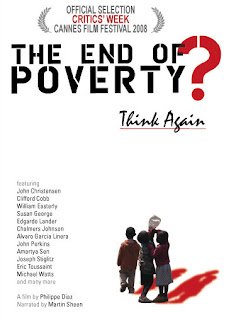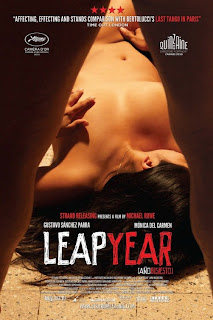Review: "The End of Poverty?"
 2009 may go down in history as the year that people stood up and really began to question the righteousness and effectiveness of our economic system. For years it has been one of the ultimate taboos to even be thought of as questioning capitalism. To do so was to be labeled a communist or worse. At one point in time it was career suicide.
2009 may go down in history as the year that people stood up and really began to question the righteousness and effectiveness of our economic system. For years it has been one of the ultimate taboos to even be thought of as questioning capitalism. To do so was to be labeled a communist or worse. At one point in time it was career suicide.But now, we have had no less than three major documentaries taking a hard look at global economics, and their detrimental effect on those who have nothing. It started with Michael Moore's Capitalism: A Love Story, The Yes Men Fix the World, and now Philippe Diaz's The End of Poverty. Each film takes a unique look at the adverse effect of unchecked capitalism. Moore's film focuses mainly on American capitalism and corporate greed. The Yes Men follows a group of corporate pranksters who take on corporate America for their injustices. The End of Poverty, on the other hand, takes a much larger and sweeping look at global economics, and the historical effects of colonialism on poverty in the third world today.
 It's no small subject, to be sure. And The End of Poverty tries to cover a lot of ground in a small amount of time. It traces the source of global poverty back to one date, 1492, and the arrival of Columbus in the New World, which began a process of colonization and marginalization of indiginous peoples by Europeans. This colonization, the film surmises, is directly responsible for global poverty as we know it today, as Europe divided up and controlled the local economies, leaving them in a state of disarray and dependency that continues to this day.
It's no small subject, to be sure. And The End of Poverty tries to cover a lot of ground in a small amount of time. It traces the source of global poverty back to one date, 1492, and the arrival of Columbus in the New World, which began a process of colonization and marginalization of indiginous peoples by Europeans. This colonization, the film surmises, is directly responsible for global poverty as we know it today, as Europe divided up and controlled the local economies, leaving them in a state of disarray and dependency that continues to this day.It's a shocking and eye opening doc that puts a searing face on the issue of global poverty. The problem is that it may be a little too far reaching for its own good. There is a lot of information thrown at us in a very short amount of time. We are given numerous statistics and percentages of how the third world has been kept in poverty by powerful governments in the Northern Hemisphere, how the World Bank has successfully kept these countries in debt and beholden to the wealthy nations. It even traces American intervention in other countries, replacing leaders who do not fall in line with the economic wishes of their creditors with those who are seemingly more friendly. In one such instance, a young assassin was sent to take out the then leader of Iraq. The assassin, a young Saddam Hussein, failed in his mission, but saw his family given control of the country by the Americans, starting a down a path that would eventually lead to the Iraq war.
 As I said, it's a sweeping and far reaching film for such a short running time. But when presented with facts such as the ability to cut global poverty in half with $20 billion, or 4% of the U.S. military budget, it's hard to deny that The End of Poverty is a film that demands to be noticed. The biggest problem is that it never offers any solutions. Its advertising touts a quote about it being "a kind of 'Inconvenient Truth' of global economics." But the major difference there is than "An Inconvenient Truth" provided answers to its problems. Watching The End of Poverty is a maddening experience, the kind of that could propel the viewer to action, but we are left with a feeling of hopelessness rather than hope. How can we break the vicious cycle that has led us to this point? What can we, the audience, do to help?
As I said, it's a sweeping and far reaching film for such a short running time. But when presented with facts such as the ability to cut global poverty in half with $20 billion, or 4% of the U.S. military budget, it's hard to deny that The End of Poverty is a film that demands to be noticed. The biggest problem is that it never offers any solutions. Its advertising touts a quote about it being "a kind of 'Inconvenient Truth' of global economics." But the major difference there is than "An Inconvenient Truth" provided answers to its problems. Watching The End of Poverty is a maddening experience, the kind of that could propel the viewer to action, but we are left with a feeling of hopelessness rather than hope. How can we break the vicious cycle that has led us to this point? What can we, the audience, do to help?The film throws fact after fact and statistic after statistic at us, but no real way for us to do anything about it. It's frustrating, wanting to help but knowing that the pattern is so entrenched that it's nearly impossible. The End of Poverty does a good job of laying out the historical roots of the problem, even if it could have used some streamlining and feels a bit overstuffed. But in the end it leaves the audience with a desire to make a difference and no outlet to do so.
GRADE - ★★½ (out of four)
THE END OF POVERTY?; Directed by Philippe Diaz; Narrated by Martin Sheen; Not rated; Opens tomorrow, 11/13, in NYC, and 11/25 in LA.



Comments
there is a solutions section of the film near the end.
among the solutions proposed by Cliff Cobb and Sergey Letouche
1. Forgive international debt unconditionally
2. Change the tax system in every country of the world so that it falls not on consumption or wages but on land ownership where wealth is concentrated
3. Restore the land to the people who actually work it...
4. End privatization of natural resources...
5. exiting the religion of growth and entering degrowth.
the film makes the mathematical arguement that we need 6 planets like ours to keep up with current consumption models. the earth doesn't regenerate fast enough so these offer a matrix of alternatives to go after.
you are right - the film is huge and we packed a lot in. the 3 hour cut is near and dear to my heart but we couldn't put it all in of course.
best,
mjs, co-producer
There needs to be a huge grassroots movement among the people to affect change.
poverty is systemic and therefore not easy to fix/undo.
there is no parallel to changing light bulbs or recycling more as an easy 'do it yourself ending poverty' you need to get involved with these high level issues. for example - I had these ideas and wrote a treatment for a film that thankfully Philippe Diaz liked enough to expand upon it. Start where you can with the grandest aim and see where it goes.
again - thanks for your thoughtful review.
I wonder, if you know, if it's in any way related to the Jeffrey Sachs book of the same name.
We're not fans. The question mark in the title is provocative to the conventional wisdom that Sachs represents.